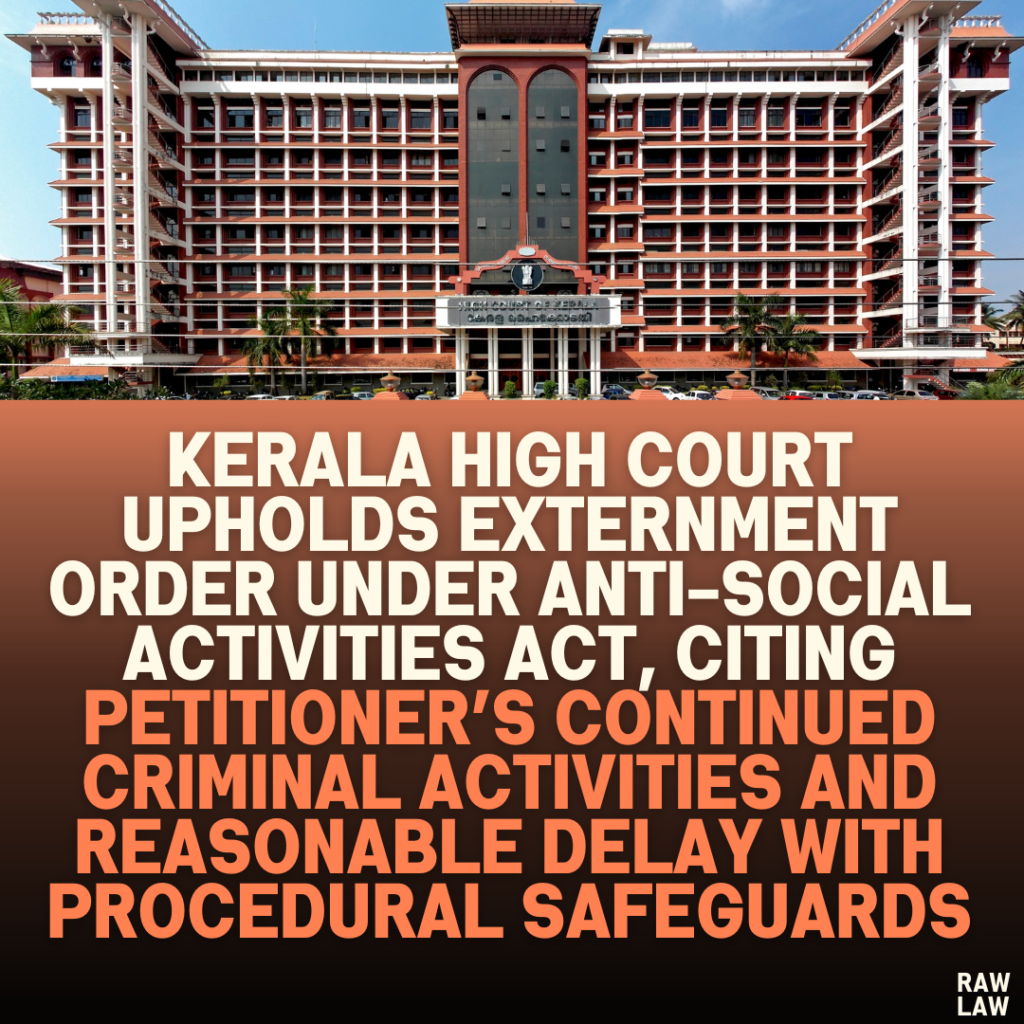Court’s Decision: The Kerala High Court dismissed the writ petition challenging the externment order issued under Section 15(1)(b) of the Kerala Anti-Social Activities (Prevention) Act, 2007 (KAA(P) Act). The court held that the delay in issuing the externment order was not excessive, given the procedural safeguards required to ensure natural justice. The court found that all necessary conditions for passing the order were satisfied, and the petitioner’s arguments did not merit interference.
Facts of the Case: The petitioner was labeled a “known rowdy” under Section 2(p)(iii) of the KAA(P) Act due to involvement in multiple criminal cases. The Station House Officer (SHO) of Cheruthuruthi Police Station submitted a report recommending proceedings under the KAA(P) Act, which was subsequently endorsed by the District Police Chief and resulted in a show-cause notice issued to the petitioner. The externment order, issued on June 21, 2024, restricted the petitioner from entering Thrissur Revenue District for six months. This order was upheld by the Advisory Board, leading to the petition challenging its validity on grounds of delay and redundancy due to concurrent proceedings under Section 107 of the CrPC.
Issues:
- Whether the delay in issuing the externment order invalidates it due to a lack of a proximate link between the petitioner’s last prejudicial activity and the order.
- Whether concurrent proceedings under Section 107 of the CrPC precluded the need for the externment order under the KAA(P) Act.
Petitioner’s Arguments: The petitioner argued that the delay in issuing the externment order severed the necessary link between the alleged prejudicial activities and the need for the order, thus rendering it invalid. Additionally, the petitioner contended that proceedings under Section 107 of the CrPC were already underway, which should have been sufficient to address any security concerns without imposing the harsher KAA(P) Act restrictions.
Respondent’s Arguments: The respondent, represented by the Public Prosecutor, argued that the delay was justifiable as due process had to be observed to ensure adherence to natural justice. The respondent maintained that proceedings under Section 107 CrPC and Section 15(1) of the KAA(P) Act operate independently. Thus, initiation of proceedings under the CrPC did not prevent authorities from issuing the externment order based on the petitioner’s continued involvement in anti-social activities.
Analysis of the Law: The court examined the requirements under Section 15(1) of the KAA(P) Act, which grants authorities the power to issue externment orders if satisfied that an individual is likely to engage in anti-social activities. The court emphasized that compliance with procedural safeguards, including issuing a show-cause notice and allowing an opportunity for the petitioner to be heard, was necessary. The court also referenced the principle that while some delay is acceptable, an undue delay could invalidate an order if it disrupts the continuity between the activities and the decision to restrict an individual’s movements.
Precedent Analysis: The court referred to the case of Stalin C.V v. State of Kerala, where it was held that minor delays in issuing externment orders are permissible as long as procedural fairness is observed. Similarly, Anita Antony v. State of Kerala clarified that proceedings under Section 107 CrPC and the KAA(P) Act serve distinct purposes and may run concurrently when necessary to uphold public safety.
Court’s Reasoning: The court reasoned that the petitioner’s history of involvement in criminal activities substantiated the externment order, and the authorities’ decision was backed by sufficient evidence. It noted that after initiation of proceedings under Section 107, the petitioner was implicated in another criminal case, justifying further restrictive measures. The court concluded that the delay in issuing the externment order was reasonable given the procedural requirements and did not sever the necessary link between the petitioner’s actions and the order.
Conclusion: The writ petition was dismissed as the court found no procedural or substantive faults in the externment order. The court ruled that the petitioner had not established grounds for overturning the order, as it was based on sufficient cause and met all necessary legal standards.
Implications: This judgment reaffirms that authorities can issue externment orders under the KAA(P) Act concurrently with other proceedings, such as those under Section 107 CrPC, to prevent anticipated anti-social activities. It also underscores the court’s discretion in tolerating reasonable delays in the issuance of externment orders as long as procedural safeguards are followed, thereby balancing individual rights with public safety interests.



